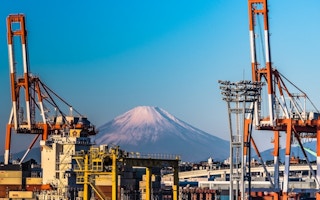Fossil fuel producers and high greenhouse gas emitters in Japan are fiercely lobbying against more ambitious emissions and energy policy that would imperil their carbon-heavy, energy-intensive business, undermining the country’s response to the climate crisis, new research has revealed.
To continue reading, subscribe to Eco‑Business.
There's something for everyone. We offer a range of subscription plans.
- Access our stories and receive our Insights Weekly newsletter with the free EB Member plan.
- Unlock unlimited access to our content and archive with EB Circle.
- Publish your content with EB Premium.
The analysis, by London-headquartered research organisation InfluenceMap, which tracks how firms lobby on climate change, shows corporate positions on climate-related policy vary across the Japanese economy, but it is largely those sectors striving to block or dilute the implementation of tougher climate targets that make their voices heard.
Industries such as carmakers, iron and steel, heavy machinery, utility firms, petrochemicals and cement producers have taken a tough stand against tighter regulations and are more actively engaged on key policy strands central to Japan’s climate change mitigation strategy.
They tend to submit detailed comments to government consultations, are represented on ministerial committees and pursue other activities ranging from social media and public relations campaigns to political funding and the backing of research that feeds into regulatory processes.
Mostly absent from intensive climate policy advocacy are groups representing key economic sectors including retail, finance, logistics, construction and real estate. Their policy engagement is often limited to statements on corporate websites, despite many individual firms backing more ambitious climate commitments and having clear goals to procure renewable energy.
With fossil fuel-intensive sectors accounting for only about 10 per cent of Japan’s gross value added (GVA), this has resulted in decision-making that diverges from the views of major portions of the economy and policy poorly aligned with international climate goals, reads the report.
Policies that have been subject to corporate influencing include Japan’s long-term strategy under the Paris Agreement, the formulation of its Nationally Determined Contributions (NDC), or decarbonisation commitments, efforts at carbon taxes, renewable energy promotion measures, energy efficiency standards, and the nation’s Strategic Energy Plan.
“
Japan’s policymaking process needs to reflect a wider range of business viewpoints, as well as public sentiment, to move towards climate solutions.
Kenichi Ishida, managing officer, Sekisui House, co-chair, Japan Climate Leaders’ Partnership
Distorted corporate influencing also permeates Japan’s largest industry association, the Japan Business Federation (Keidanren), which as a central negotiating point for government agencies plays a key role in the formulation of industrial legislation, says the study.
With over 100 key industry associations and some 1,400 individual companies across the economy as members, Keidanren claims to represent the stances of large parts of the Japanese economy. This means it comes to the table with a powerful mandate.
But with only a narrow group of sectors dominating Keidanren’s emissions and energy policy engagement process, the climate policy positions the Tokyo-based cross-sector federation adopts are largely misaligned with global climate goals. Keidanren has traditionally strongly opposed more ambitious climate targets and pushed for a voluntary, sector-specific bottom-up approach to decarbonisation.
The study shows the position of Keidanren’s chairman has always been occupied by representatives from large industrial companies such as automaker Toyota, steel manufacturer Nippon Steel, textile firm Toray Industries, power producer Tokyo Electric Power, and currently, Hitachi, a conglomerate that builds digital solutions for the mobility, energy and information technology sectors. There has yet to be a Keidanren chair from the service sectors.
Keidanren ranks among the world’s most powerful industry groups active on the climate policy agenda, along with other cross-sector industry groups in other countries such as the US Chamber of Commerce and the National Association of Manufacturers in the US.
In March this year, Japan—the world’s fifth-largest emitter of climate-disrupting greenhouse gases—announced its updated NDC to the Paris Agreement but failed to ratchet up its previous target of cutting carbon emissions by 26 per cent from 2013 levels, drawing global criticism.
Japan’s 2020 submission targets 22-24 per cent renewables, and 26 per cent coal in the power generation mix by 2030.
Domestically, various business coalitions including the Japan Association of Corporate Executives (Keizai Doyukai) and the Japan Climate Leaders’ Partnership (JCLP), which aims to create a low-carbon society and counts the likes of electronics giant Fujitsu and imaging and electronics company Ricoh among its members, have called for tougher renewables and climate targets.
According to InfluenceMap, a policy revision in line with the Paris climate deal is unlikely to happen in Japan without major reform of how economic sectors are represented both within Keidanren and government decision-making processes.
Commenting on the findings of the analysis, Kenichi Ishida, managing officer at Japanese homebuilder Sekisui House and JCLP co-chair, said how industry associations interact with Japan’s lawmakers on climate policy issues needed to change.
“This research shows that only a limited part of the industry is significantly influencing energy policy in Japan and is delaying the decarbonisation process,” he said. “However, the voice of this limited business segment is now counter to the growing number of Japanese companies seeking to decarbonise and the 94 municipalities representing most of Japan’s population who want to see this happen by 2050.”
“Japan’s policymaking process needs to reflect a wider range of business viewpoints, as well as public sentiment, to move towards climate solutions,” he added.
Hikaru Kobayashi, former vice-minister of the environment in Japan, said climate-related policy decisions in Japan are “heavily influenced by incumbent industry groups, vested interests protecting their positions and avoiding new ideas”. This, he observed, threatens to hold back business innovation and reduce Japan’s economic competitiveness.










